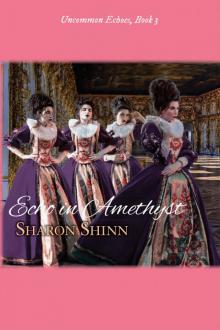- Home
- Sharon Shinn
Heart of Gold Page 4
Heart of Gold Read online
Page 4
“You’ve got time, after all,” Kit said neutrally. “He’s only twelve. In a few years, you may see so many blueskin men taking on jobs in the city that it will seem like the right thing for everyone to do. But if you hold him back now—”
“I know! Exactly! He’ll lose his advantage, he’ll lose his initiative, and then he won’t even have a chance to show us how good he could be! The strange thing is, I don’t think this decision would be nearly so hard if he was my daughter instead of my son. I even think—if one of them had been a girl—I would have spent most of my energy deciding how to direct her. But I can’t stand the thought that my children won’t have the same chances as Yasmina Boswen’s girls. Bascom’s as smart as Marrina. And I won’t hold him back.” She smiled a little painfully over at her cousin. “So you see, you’re not the only rebel in the family.”
“I won’t tell Granmama,” Kit said, returning the smile. “It would do her in. And just for the record, I’m proud of you.”
“Not exactly a comfort to have you on my side,” Sereva said, but she laughed.
Kit laughed back. “Someday it will be,” she said. “Just wait and see.”
* * *
* * *
So that was the evening, which lasted much longer than Kit was accustomed to. It was close to midnight before they finalized plans for Kit to return the following day, carrying enough luggage to see her through a week. Then Sereva bundled her into the limousine and adjured Simon to drive extremely carefully. Not that there was far to go. For Sereva, for Granmama, for any respectable blueskin matron, there was only one neighborhood in which to locate the town house, and that was a small enough district that, in daylight, Kit wouldn’t have minded making the trek on foot. But now, in the dark and full of food and wine, she was just as glad to be spared the effort. She snuggled deep into the plush leather of the seat and drowsed until Simon pulled up before her grandmother’s house.
“Thank you,” she made a point of saying as she climbed from the car. All the street-level lights were on in the four-story house, and before Kit could put a hand to the door, it was opened by a blueskin servant. There was no hour of the night or day when there was not some footman on duty to attend to any emergencies or sudden whims of the residents. At first, Kit had found this a little disconcerting, but she had grown to like the idea that, no matter how wakeful and isolated she might feel, even in the middle of the night, somewhere in the mansion was another soul alert and ready to spring to her aid.
“Good evening, Patrin,” she said to the young man at the door.
“Good evening, hela,” he replied.
“I assume my grandmother is asleep?”
“Not quite yet,” he said, a shade of regret in his well-trained voice. “She indicated that she wished to wait up for you.”
Kit grimaced. “Oh, joy. All right. I’ll go right up.”
So she climbed up two flights of stairs to the suites where her grandmother lived. Some of the more modern city homes had been built with elevators, but Granmama, a hard-core traditionalist, would have no such contemporary devices in her home. Instead, a lovingly maintained wooden staircase curved up all four flights of the house, even into the servants’ quarters on the upper level. Granmama never asked for anyone’s help climbing those two flights, either, and she probably made the trip five times a day. The exercise must be what kept her in such fearsomely good health, Kit thought. She herself was just a little winded by the time she made the landing on the third floor.
The door to her grandmother’s suite was closed, but a spray of light spilled out over the threshold. Kit waited till she had caught her breath, then knocked lightly on the door. “Granmama? Patrin said you wanted to see me when I came home.”
“Yes, yes, come in,” was the impatient invitation from inside the room. Kit opened the door and stepped in.
Her grandmother’s sitting room was the most beautiful room in a truly elegant home. Each of the five high windows was draped with pale green linen; the ivory wallpaper was patterned with ivied trellises. The furniture was upholstered in emerald-colored damask and carefully arranged over a luminous hardwood floor. Potted plants and cut flowers were set on tiers of wrought-iron stands, so that the room was filled with the scent and color of living beauty. Everywhere were reminders that this was a woman tied to the land, who derived her wealth, her strength, and her sense of time from the regulated seasons of nature.
That woman was seated in a huge, overstuffed armchair, almost lost in a gold satin robe and the contours of the chair itself. She was small-boned and delicate, and anyone who did not know her would think she was frail. Her skin, once a cobalt so deep it had appeared almost ebony, had lightened over time to a soft, washed denim; her black hair had turned a vivid white. A stranger would have thought he beheld a woman whose intensity and will had been slowly drained by the inexorable leeching of age; but he would have been mistaken.
“Good evening, Granmama,” Kit said formally. “If I’d known you would be waiting for me, I would have come sooner.”
“If I had grown tired of waiting for you, I would have gone to bed,” was the dry reply. “Sit down. Talk to me. You look tired.”
Kit smiled and seated herself on the divan closest to her grandmother. “It’s Sereva’s wine. I’m not used to drinking anything so deceptive and potent.”
“It’s good for you,” her grandmother responded instantly. “Wine clears the mind and settles the systems. Good wine, anyway. Bad wine rots your stomach.”
“Well, then my stomach is probably a sieve by now.”
“How’s that boy of hers? Bascom? She told me she’d enrolled him in some special class.”
Kit hadn’t expected to be drawn into this debate quite so quickly. “Yes, an advanced science class. He seems to enjoy it.”
Granmama made a slight sniff of annoyance. “Waste of time. If he enjoys it, fine, let him have his fun. No use to him to know all that scientific nonsense once he’s living in-country.”
“That’s years away,” Kit said neutrally. “Who knows what will happen in the next ten years?”
“I know,” Granmama said instantly. “I was at the Lansdon estate last time I was in-country. Jeretta Lansdon had her little granddaughter there—daughter of what’s his name, her second boy. Now that would be a good match. I’d been thinking about Kellisia Faremen’s daughter, because she’s got the bloodlines and the beauty, but there’s something about the girl I don’t quite like. Too soft, I think that’s it. Too easily swayed by someone else’s opinion. That’s a dangerous trait, and you can always spot it early.”
“Granmama, she’s only fourteen, if she’s the one I’m thinking of.”
“That’s her. And she might do yet. But Jeretta’s daughter just appealed to me. I’m thinking she might be the one.”
“And she’s how old?”
“Eight this spring.”
“And Bascom is twelve? Granmama, they’re children. How can you consider pairing them up when they aren’t even people yet? You talk like you’re planning to breed a couple of dogs.”
Granmama turned the full force of an icy stare in Kit’s direction. Most of the indigo had dark eyes, brown or black; only a handful, the descendants of the most uncorrupted bloodlines, had blue eyes. Granmama’s were a startling layered turquoise flecked with chips of granite; they appeared to be lit from behind by an unwavering torch.
“Marriage among the Higher Hundred can never be left to chance,” she said in a calm, measured voice. “There is too much at stake. Do you know how much property Sereva owns outright, property that came to her through her mother and through her marriage settlement? Neither Bascom nor Marcus can inherit that land. Unless they marry, and marry well, all that property goes to the daughters of a second cousin of mine who married a mid-caste boy and squandered her life. I’ve only met her daughters a few times, and let me tell you, I will scheme and m
atchmake until the day I die to prevent either one of them from inheriting an acre of my mother’s land. And if that means Bascom and Marcus must be betrothed before they turn thirteen, so be it. It is the way of our world, and it is a good way.”
Kit knew she shouldn’t, but she couldn’t help herself. “Land—isn’t there anything else you think of? Anything else you care about?” she demanded. “Is a piece of property more valuable to you than the happiness of a human being?”
“The land is all that lasts. The land is the only thing that links us, one generation to the next, and keeps us safe,” her grandmother declared in a steely voice. “Is it more important than happiness? Of course it is. Whoever was happy more than a few days together at a time? Whoever truly knew what would make him happy? Are you happy? You think you’re such a rebel, you think you’re so free, but I’ve seen you sobbing when you thought I wasn’t looking, and you wouldn’t be in this house at this moment if you had any other place to go. And you’re going to hold your life up as an example? If your father had left you to me to raise when your mother died, do you think you would be happier than you are now? I know the answer to that one. You’d be just like your cousin Sereva, and she’s a good girl, calm and content. Wouldn’t you rather be like her some days than the person you are now?”
This was why it was dangerous to quarrel with her grandmother, not because it made her so angry but because Granmama’s blunt, sledgehammer arguments sometimes made a brutal sort of sense. Oh, no doubt, reared side by side with her cousin, Kit would have been as much like Sereva as a twin. She would have willingly married the man of her grandmother’s choice, thoughtfully undertaken the management of her estates, and unquestioningly followed the dictates of a culture bound by tradition. And—hard to refute this point—she would almost certainly be less miserable than she was now.
But. “I am not Sereva, and I was not brought up as she was,” Kit answered calmly. “I was raised to ask questions, to see that the world has more elemental laws than the rules of the Higher Hundred. You say a boy cannot study science or become a mathematician. I say, why not? What makes your traditions more worthwhile than a single man’s desires? What has made you the only woman in the world who knows what is right and what is wrong?”
“They are not my laws. They are not my opinions. They are the truths and customs that have evolved over a hundred generations. Do you think you are the first fiery young girl to rail against some practice that she thought was archaic and restrictive? We have these customs, we have these laws, because they protect a way of life that the majority of us value. If we bent and changed for every fleeting whim of young girls like you, we would have no society worth handing down from mother to daughter. We would have no land, no possessions, no wealth. And you would have nothing to rail against. Would you like that better?”
Kit jumped to her feet, unable to sit still a second longer. She was filled with a liquid protest that seemed half fury and half despair, and she did not know how to articulate any of it. “I think you could be more open to change and yet not lose all those possessions you prize so much—yes, I do think that,” she said rapidly. “I think you could say, ‘I don’t want to lose my land, but I want my great-grandson to be happy. I want him to have every opportunity I would give his sister if he had one.’ You could say, ‘This I must keep, but this I am willing to examine and perhaps cast aside.’ You could say—”
“I could, but I will not,” Granmama said, interrupting again. “Because I do not believe any of those things. Once you compromise your values, you begin to lose ground. The things that matter to you get worn away—or wrested away. You must fight every day to hold on to what matters. And you will see. I am right. Ask Bascom, forty years from now, when he is married and living on his wife’s estates and sees how good his life has been. I will not be here, but you will. Ask him then what he regrets, and I can tell you now what the answer will be. He will regret nothing.”
He will regret all of it, Kit thought, but she did not say so. How could she be sure? How could Granmama? “I won’t have to ask him,” she said over her shoulder, because she had come to a halt looking out one of the curtained windows. “Because you will surprise everyone if you do not live forever. You can ask him yourself.”
Granmama was tricked into a laugh. “Then in forty years, I will ask you the same question. And I will expect an honest reply.”
Kit smiled at the green draperies, then pivoted to share the smile with her grandmother. “Agreed,” she said, crossing the room to kiss the old lady on the cheek. “Good night, hela Candachi. I will spar with you in the morning.”
“And in the evening as well.”
One hand on the door, Kit paused. “No—not in the evening. I’ve told Sereva I will come spend a few days at her house.”
Granmama nodded. “That will be good for both of you. Tell her to invite me to dinner one night while you are there.”
“All right. I will. Good night.”
And she escaped from the lovely, suffocating room. If only it were as easy to escape from the suffocating life that her grandmother was determined to have her live.
CHAPTER THREE
Kit was awake with the dawn, and ready to leave the house thirty minutes later. As always, she wasted little time on her appearance. That, of course, was more a rebellion against the gulden than the indigo, for among the guldwomen, elaborate dress and cosmetics were essential; only a beautiful woman would attract a virile man. There were detailed, torturous rituals the unmarried women went through every day to make themselves look desirable. Not until she had come to the city had Kit ever seen the bare face of a gulden woman.
Kit herself only bothered with a quick shower and throwing on the most casual of clothes. The most tedious part of her toilette consisted in toweling dry the thick, unmanageable mane of black curls and then, once she’d run a comb through it, clipping back the whole mass at the nape of her neck.
She would really be much happier with the closely cropped cut she had seen on many of the most fashionable city girls, but she couldn’t bring herself to chop off her hair. Her father had always admired it, that was one reason; but Jex had always adored it, had loved to bury his face in the rioting black curls and wrap them around his fingers. She could not forgo those memories, so she lived with the inconvenience. She pulled her hair back and sauntered from the house.
After a short wait, she hopped onto the nearest shuttle to the Centrifuge. It was crowded, as it was every morning, but nothing like the way it had been yesterday upon Chay’s arrival. She caught a ringcar within ten minutes, and took off fast.
She loved the Centrifuge. Loved it. She knew she was exactly the type of driver who shouldn’t be allowed in the tunnels, but she couldn’t help herself. Every time she climbed into one of the ringcars, she felt a rising, guilty sense of excitement that she could not resist. She would slip instantly into the upper lane and accelerate as fast as the traffic would permit, and she would swoop into the middle and even the slow, lower lanes if it would allow her to zip by someone in the upper level who was moving too slowly. Other times, she would merely ride as close as she dared to whatever slowpoke was blocking her way, and more often than not the driver would dip into the center lane to let her pass. They weren’t all gracious about this; more than once she saw angry faces turned her way from the windows of the other cars, and just as often a furiously gesturing hand. She didn’t care. She knew she was rude, and she didn’t care. She knew she was dangerous, and she didn’t care. She loved the Centrifuge, and she craved its speed.
Once in the city, of course, she was more sedate. She could either take the trolley or go on foot to her destination, and either way, the pace was slow. Once she exited the Centrifuge at the West Zero gate, the distance was not far, and she often elected to walk it, though even she was a little nervous from time to time in this neighborhood.
When she had come back to the city six months ago, she
had had no clear idea what she would do with herself. She had degrees from City College in anthropology, linguistics, and history, but she had no interest in teaching rich young indigo girls about the origins of their race and the peculiarities of their language. She could have taken a job at one of the city museums, but she was too restless to tiptoe down the quiet halls and spend all day in reverence over objects from the past. She needed to do something with meaning, something that would give her life some value. These days, it seemed to have so little.
So she went to the charity bank on the west edge of the city, outside the loop of the Centrifuge, and offered her services. They were wary of her there in the Lost City, of course—she looked every inch the blueskin heiress and she knew it—but her father’s name bought her instant recognition and a grudging tolerance. “Tell me what you need done,” she had said to the old gulden woman named Del who ran the place. “I can help you.”
And help them she had. The charity bank was multipurpose and greatly overburdened. It served as a school for the poorest children in the neighborhood, a food pantry for those who could not buy their own, a medical center for the sick, a shelter for shivering gulden women straight in from the mountains who had nowhere to go for safety and were often in fear for their lives. It was a place where there were only women and children, and even the boys, once they had begun to gain their teenage height and lose their childlike voices, were viewed with suspicion. There was a tumbledown community center a few blocks away, built for just such a troublesome group: transplanted gulden boys who did not know the ways of the city and had been ripped from the ways of Geldricht.
It was hard to know what would happen to these boys, for, in terms of population percentage, there were very few of them, and this was really only the first generation that had been brought up in the city. As gulden men in Geldricht, of course, they would be reared as kings; they were strong voices in their ancestral households from the time they were very young. A gulden man had absolute power over his wife and, if she was unmarried, his sister—and, if she was widowed and he was over twelve, his mother. It was a right so basic, a law so inherent, that even women who had run to the city when their sons were infants watched their boys fearfully as they began to grow to adulthood. What buried trigger, what race memory, would remind these young men that they were the lords and these women merely chattels? No city guldwoman taught her son these principles, of course, at least not deliberately, but somehow the knowledge seemed to be there, instinctual and fully formed. As a boy edged to manhood, he changed. Kit had seen it. So had the women of the ghetto.

 Jenna Starborn
Jenna Starborn Troubled Waters
Troubled Waters The Thirteenth House
The Thirteenth House Reader and Raelynx
Reader and Raelynx Angel-Seeker
Angel-Seeker Archangel
Archangel Jeweled Fire
Jeweled Fire Nocturne
Nocturne The Shape-Changer's Wife
The Shape-Changer's Wife Still Life With Shape-Shifter
Still Life With Shape-Shifter Quatrain
Quatrain Fortune and Fate
Fortune and Fate Angelica
Angelica Summers at Castle Auburn
Summers at Castle Auburn Echo in Amethyst
Echo in Amethyst The Turning Season
The Turning Season Mystic and Rider
Mystic and Rider Heart of Gold
Heart of Gold The Shape of Desire
The Shape of Desire Echo in Onyx
Echo in Onyx Royal Airs
Royal Airs Gateway
Gateway The Safe-Keeper's Secret
The Safe-Keeper's Secret Wrapt in Crystal
Wrapt in Crystal Unquiet Land
Unquiet Land Jovah's Angel
Jovah's Angel Dark Moon Defender (Twelve Houses)
Dark Moon Defender (Twelve Houses) Mystic and Rider (Twelve Houses)
Mystic and Rider (Twelve Houses) Fortune and Fate (Twelve Houses)
Fortune and Fate (Twelve Houses) Reader and Raelynx (Twelve Houses)
Reader and Raelynx (Twelve Houses)